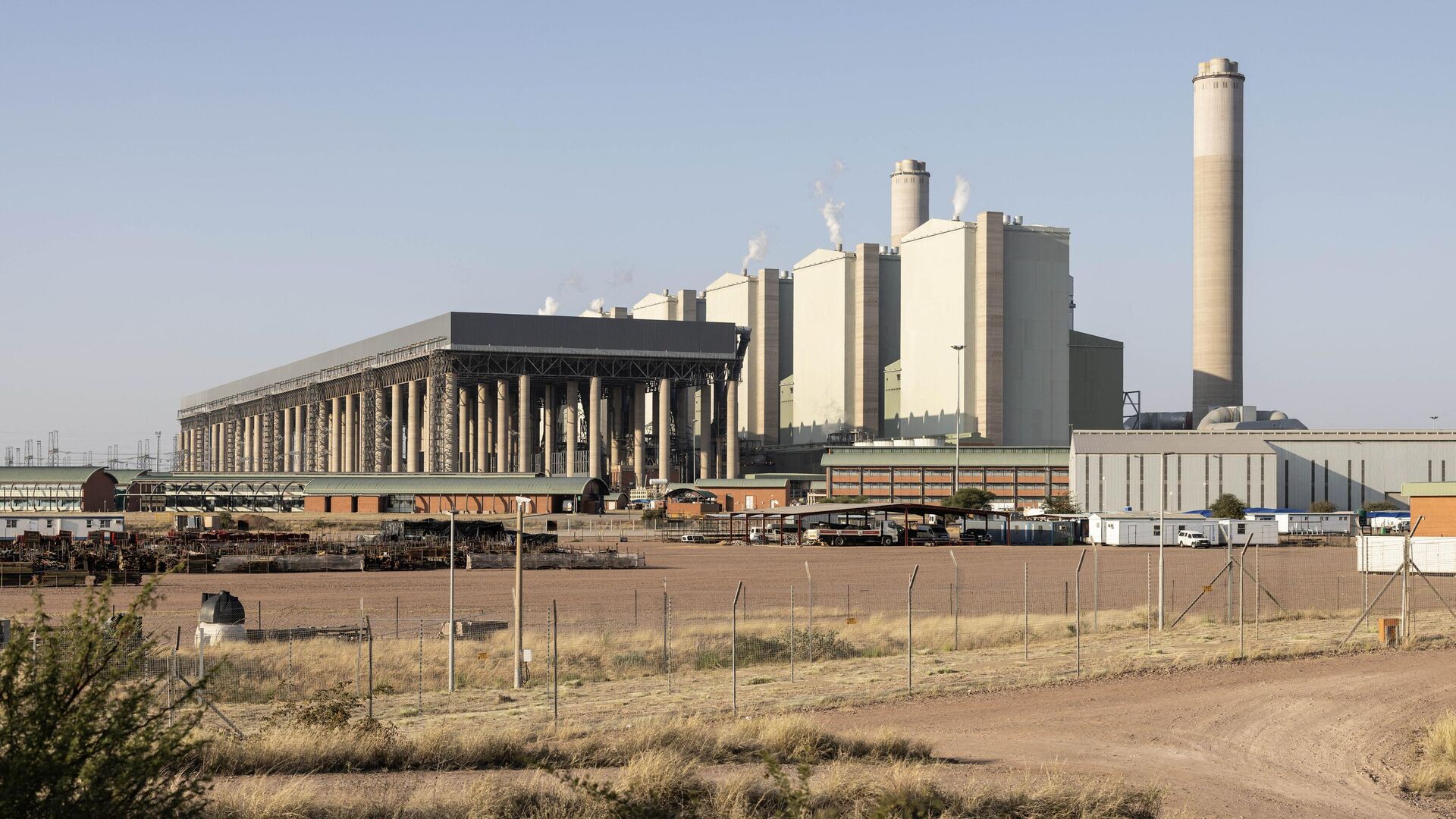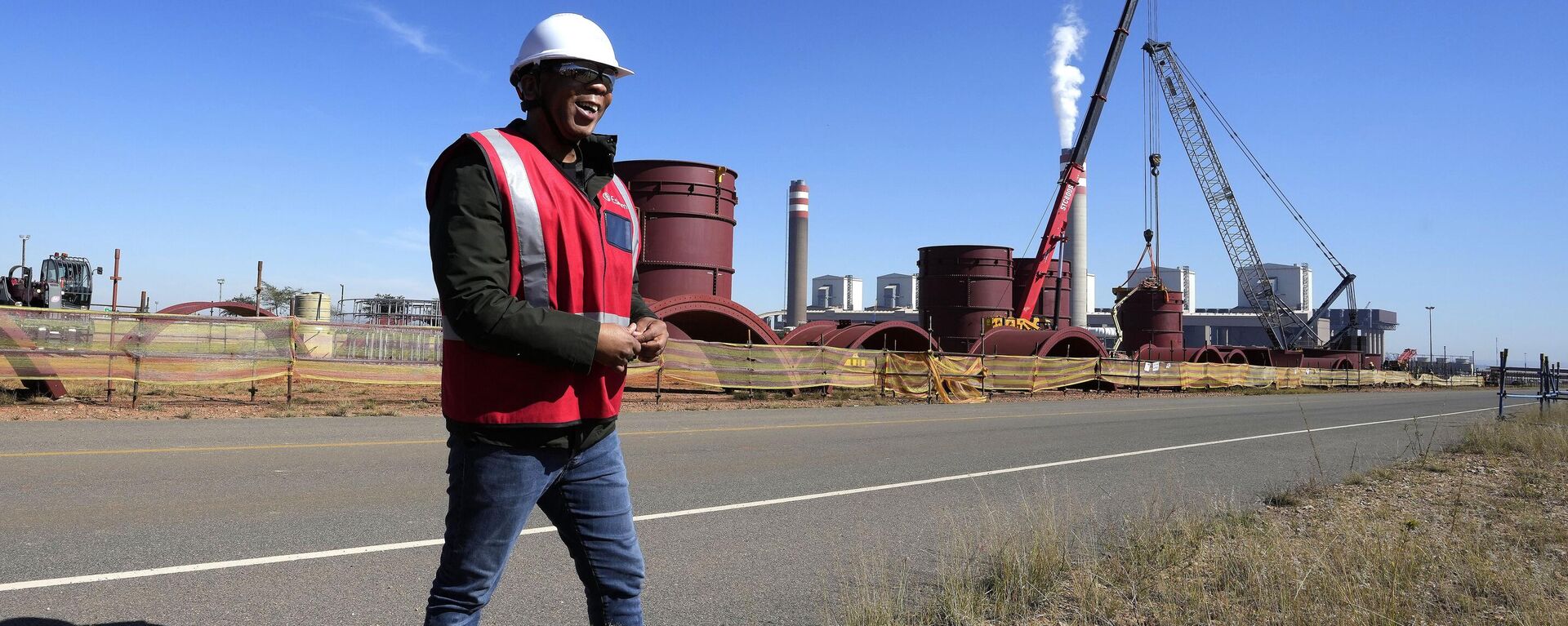https://en.sputniknews.africa/20230702/relief-in-sight-for-south-africas-power-crisis-daily-blackouts-expected-to-decline-minister-says-1060289205.html
Relief in Sight for South Africa's Power Crisis: Daily Blackouts Expected to Decline, Minister Says
Relief in Sight for South Africa's Power Crisis: Daily Blackouts Expected to Decline, Minister Says
Sputnik Africa
South Africa, one of Africa's most developed countries, is currently facing a severe energy crisis that threatens to undermine economic and social stability... 02.07.2023, Sputnik Africa
2023-07-02T17:17+0200
2023-07-02T17:17+0200
2023-07-02T17:17+0200
sub-saharan africa
southern africa
south africa
electricity
energy crisis
eskom
https://cdn1.img.sputniknews.africa/img/07e7/07/02/1060290382_0:0:3072:1728_1920x0_80_0_0_67623d04f96517e75fa57885f832f84a.jpg
South Africa is nearing the end of its daily blackouts, according to the country's electricity minister, Kgosientsho Ramokgopa. With the return of warmer weather towards the end of the year, South Africa is expected to see a reduction in blackouts. However, an exact date for the end of blackouts has not been given.This year, South Africa was expected to experience the most blackout days in its history, with daily blackouts lasting up to 10 hours. The blackouts have had a significant impact on businesses and households, further straining an already struggling economy.The newly appointed minister stated in a press conference that South Africa could soon enjoy 24 hours without blackouts.The power cuts, known locally as loadshedding, are expected to reduce the country's GDP by 2% this year, according to the South African Reserve Bank.While the frequency of blackouts has decreased recently, concerns remain as winter intensifies in July and August. Higher heating demand during this period could put a strain on power plants. However, temperatures are expected to rise again in September, alleviating some of these concerns.According to the minister, the worst-case scenario of winter peak demand of 34,000 megawatts (MW) did not materialize due to interventions in system maintenance and availability, as well as efforts by businesses and households.Ramokgopa pointed out that the available capacity has plateaued at around 29,000 MW, leaving enough room to bring the blackouts down to stage 3, where 3,000 MW will be taken off the grid.This would result in between two and four hours of blackouts per day, the minister added. South Africa is implementing blackouts in stages from one to eight, with eight being the highest and resulting in over 10 hours of blackouts daily.Minister Ramokgopa said the country had reached a stage where power generation was beginning to catch up with demand, with blackouts dropping from stage 6 to stage 3 in the space of six weeks.South Africa is facing an energy crisis for a variety of reasons, including lack of investment in its aging power infrastructure, delays in building new power plants, and mismanagement and corruption within Eskom, the state-owned power utility responsible for providing 95% of the country's electricity. The crisis has led to frequent blackouts.
https://en.sputniknews.africa/20230626/south-africas-electricity-minister-hails-progress-in-reducing-power-outages-1060165079.html
southern africa
south africa
Sputnik Africa
feedback@sputniknews.com
+74956456601
MIA „Rossiya Segodnya“
2023
Muhammad Nooh Osman
https://cdn1.img.sputniknews.africa/img/07e7/04/0a/1058467512_0:0:1280:1280_100x100_80_0_0_ec723833bcbfcaed2e21952965ad99e4.jpg
Muhammad Nooh Osman
https://cdn1.img.sputniknews.africa/img/07e7/04/0a/1058467512_0:0:1280:1280_100x100_80_0_0_ec723833bcbfcaed2e21952965ad99e4.jpg
News
en_EN
Sputnik Africa
feedback@sputniknews.com
+74956456601
MIA „Rossiya Segodnya“
Sputnik Africa
feedback@sputniknews.com
+74956456601
MIA „Rossiya Segodnya“
Muhammad Nooh Osman
https://cdn1.img.sputniknews.africa/img/07e7/04/0a/1058467512_0:0:1280:1280_100x100_80_0_0_ec723833bcbfcaed2e21952965ad99e4.jpg
southern africa, south africa, electricity, energy crisis, eskom
southern africa, south africa, electricity, energy crisis, eskom
Relief in Sight for South Africa's Power Crisis: Daily Blackouts Expected to Decline, Minister Says
Muhammad Nooh Osman
Writer/Editor
South Africa, one of Africa's most developed countries, is currently facing a severe energy crisis that threatens to undermine economic and social stability. To address the problem, the government declared a state of "national disaster" from February to April, committed to repaying over 60% of Eskom's debt, and created a ministry for electricity.
South Africa is nearing the end of its daily blackouts, according to the country's electricity minister, Kgosientsho Ramokgopa. With the return of warmer weather towards the end of the year, South Africa is expected to see a
reduction in blackouts. However, an exact date for the end of blackouts has not been given.
This year, South Africa was expected to experience the most blackout days in its history, with daily blackouts lasting up to 10 hours. The blackouts have had a significant impact on businesses and households, further straining an already struggling economy.
The newly appointed minister stated in a press conference that South Africa could soon enjoy 24 hours without blackouts.
"I want to say to the South African people we are much, much closer to that date," Ramokgopa said.
The power cuts, known locally as
loadshedding, are expected to reduce the country's GDP by 2% this year, according to the South African Reserve Bank.
While the frequency of blackouts has decreased recently, concerns remain as winter intensifies in July and August. Higher heating demand during this period could put a strain on power plants. However, temperatures are expected to rise again in September, alleviating some of these concerns.
"I know when we get into summer conditions, then at the current rate, generation will far exceed demand," Ramokgopa said.
According to the minister, the worst-case scenario of winter peak demand of 34,000 megawatts (MW) did not materialize due to interventions in system maintenance and availability, as well as efforts by businesses and households.
Ramokgopa pointed out that the available capacity has plateaued at around 29,000 MW, leaving enough room to bring the
blackouts down to stage 3, where 3,000 MW will be taken off the grid.
This would result in between two and four hours of blackouts per day, the minister added. South Africa is implementing blackouts in stages from one to eight, with eight being the highest and resulting in over 10 hours of blackouts daily.
Minister Ramokgopa said the country had reached a stage where power generation was beginning to
catch up with demand, with blackouts dropping from stage 6 to stage 3 in the space of six weeks.
South Africa is facing an energy crisis for a variety of reasons, including lack of investment in its aging power infrastructure, delays in building new power plants, and mismanagement and corruption within Eskom, the state-owned power utility responsible for providing 95% of the country's electricity. The crisis has led to frequent blackouts.



